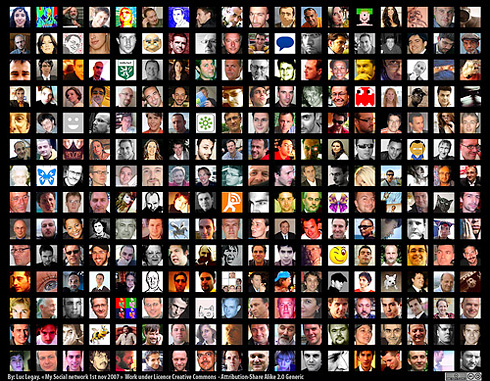
Photo by Luc Legay on Flickr (CC BY-SA)
Social networks have provably made a difference in people’s lives
 Guest post by George Weiner
Guest post by George Weiner
Chief Technology Officer, DoSomething
Like a bull through a china shop, Malcolm Gladwell’s recent article in the New Yorker, Small Change: Why the Revolution will not be Tweeted, plows through social media enabled activism, dismissing its past and future potential as a tool for impact. Full disclosure, I am a huge fan of his work and have read almost every page he has written, but I think he missed the mark here. He has a flare for using selective case studies to draw brilliant macro social behavioral theories, and this article is no different.

Barack Obama used Facebook and broader online networks to deliver unprecedented access to his campaign and the political process and was rewarded with immense grassroots support and fundraising success. So my answer to Gladwell’s question is: Yes, Obama is on my short list for people who are the “best hope for us all.”
A tool need not work in every instance to be valuable. The story is not “Social networks always work”; it is that they can work. My biggest fear of Gladwell’s article, especially given his credibility and platform, is that it will serve as the rallying cry for old-school not-for-profit organizations to keep their heads in the sand.
I believe social media is a must for not-for profits seeking to increase their impact. If a nonprofit or not-for-profit (NFP) relies on people in any way, then they must go where they are and where they communicate. The common thread that can be drawn between successful social media NFPs is the participation from the executive level. This is a world in which Gladwell has zero experience and that has to be considered before it becomes the gospel of NFP execs choosing to insulate themselves from change.
It’s not about the tools or the size of our lists
Those who believe in social networking as a tool for impact have responded with torrents of positive case studies and examples of online fundraising successes. Ironically, these responses are selective in the same way Gladwell is, overlooking the shortcomings inherent in loose-tie networks. There is a real danger in automatically equating a big social media list to big impact, because we lose sight of what real change is about. Many of these responses, I think, have missed the larger point.
What I love about the article was summarized in this line: “Where activists were once defined by their actions, they are now defined by their tools.” It reminds me of our myopic obsession about the size of our lists over the depth of connection and real social impact. It screams “let’s not shit ourselves” – Twitter doesn’t deserve a Nobel any more than a mobile phone, laptop, printing press or other communication tools do. Give people more avenues to communicate meaningful ideas and good things will happen.
By the way, barring a fail whale, news about the #revolution will be tweeted.
Other interesting critiques
• Will the Revolution Be Tweeted? (Idealware)
• Mobilize your social network (Or, is Malcolm Gladwell full of it?) (Socialbrite)
• Gladwell on Social Media and Activism (The Atlantic)
• Malcolm Gladwell: Twitter, You’re No Martin Luther King (Wired)
• Social Media for Good and Evil, Strong and Weak Ties, Online/Offline,and Orgs and Networks (Beth Kanter)
 This work is licensed under a Creative Commons Attribution-NonCommercial 3.0 Unported.
This work is licensed under a Creative Commons Attribution-NonCommercial 3.0 Unported.









George – Great article as usual. I haven't read Gladwell's article yet, so any portion of this comment hereafter can justifiably be criticized as uninformed. The comparison to the civil rights movement seems ridiculous, simply because Facebook and other social movements have been used to organize many "fundamental rights" type movements. I think the gay rights movement is perhaps the most glaring example. Nevertheless, the comparison seems even less apt in the context of size. Facebook's impact is far beyond one issue, and expands into the daily lives of people worldwide.
True- I think the quantifiable measures Gladwell looks for are near impossible to capture as it relates to breadth of causes impacted by this level + scale of communication.
Oh, Lordy. The dreaded social media ROI.
BTW, I was reading Nicolas Kristoff's piece in the New York Times Magazine yesterday, nice mention of DoSomething in his DIY Foreign Aid article:
http://www.nytimes.com/2010/10/24/magazine/24volu…
We love to see our DoSomething Award winners out there!
Hey Handsome Giorgio,
You certainly "said it well" as far as I'm concerned! So nice to see you "youngsters, activists, movers and shakers" speak coherently!!. I remember you "beating" me in a race when you were 5 years old…and then again when I rode a bike and you beat me, running.